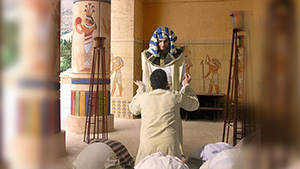 The portion of the Bible recorded from Genesis 37-50 gives an account of the character of two men, Judah and Joseph. This is prophecy because it provides the foundation for subsequent leadership in Israel. When Israel finally possessed the land following the Exodus, the tribes of Judah and Joseph received the territory of the central highlands from the Judean wilderness north to the Jezreel valley. This is the area of the land that is most significant from a spiritual standpoint. It is referred today in the international media as the “Israeli occupied West Bank”. It is, without doubt, the most highly contested real estate in the world. During the First Kingdom era (1447 – 586 BC/BCE), the tribes of Israel were most often divided into two groups; Judea in the South and Ephraim (Joseph) in the North. Ultimately, Judea was predicted to be the primary vessel of redemption (see Jacob’s prophecy – Genesis 49:8-10).
The portion of the Bible recorded from Genesis 37-50 gives an account of the character of two men, Judah and Joseph. This is prophecy because it provides the foundation for subsequent leadership in Israel. When Israel finally possessed the land following the Exodus, the tribes of Judah and Joseph received the territory of the central highlands from the Judean wilderness north to the Jezreel valley. This is the area of the land that is most significant from a spiritual standpoint. It is referred today in the international media as the “Israeli occupied West Bank”. It is, without doubt, the most highly contested real estate in the world. During the First Kingdom era (1447 – 586 BC/BCE), the tribes of Israel were most often divided into two groups; Judea in the South and Ephraim (Joseph) in the North. Ultimately, Judea was predicted to be the primary vessel of redemption (see Jacob’s prophecy – Genesis 49:8-10).
Joseph’s portrayal is one of the most positive in the Bible. He was a man of strong revelation faith. He was confident of his election and, therefore, refused to be discouraged. He was falsely charged by Potipher’s wife and thrown into prison. He didn’t complain. Instead he was positive and productive so that he was placed in charge of all the prisoners under the oversight of the chief jailer. Even though he spent many years in prison, his faith never faltered. When presented with the dreams of his fellow prisoners, he readily received interpretation of those dreams and credited the interpretations to God. The same was true when he interpreted the dreams of the Pharaoh.
After interpreting Pharaoh’s dreams, Joseph was placed in charge of all of Egypt with the exception of the Pharaoh himself. Joseph was a type of Messiah. He was a man full of faith. He was always extremely productive. He was always subordinate to the one who granted him authority. He fulfilled his responsibilities and in the process purchased the whole land of Egypt for the Pharaoh. In this way Joseph became a powerful type of the Messiah to come, portraying Messiah’s characteristics, position and purpose.
The account of Joseph interacting with his brothers is one of the most heart-warming stories in the Bible. However, as inviting as the story is, we must not lose sight of the reason the account is included in the Bible. The Bible is giving us an account of the emerging leadership characteristics of Judah. Judah was the fourth born son of Israel and therefore not in the position to assume leadership. The events recorded in these sections of the Bible shows how he emerged as leader. Note that in the first encounter of the brothers with Joseph, Simeon was taken as a hostage by Joseph. Reuben, the first-born, failed to offer himself in the place of his younger brother Simeon. When Israel decided to send his sons back to Egypt for more grain, he understood that his youngest son, Benjamin, would have to be sent on the journey. Reuben told his father that he could kill his sons, Jacob’s grandsons, if Benjamin did not return safely. Judah told his father that he would assume full responsibility for the safe return of Benjamin. In the second encounter of Joseph with his brothers, Benjamin was taken as a prisoner because of the charge that he had stolen Joseph’s cup. Judah stepped in and offered himself in the place of his younger brother. Judah was willing to lay down his life for his brother (John 15:13). This is the reason that Judah emerged as leader.
Later Messiah Jesus will exhort His followers to “take up their cross and follow Him”. Judah provides us with a picture of “taking up the cross”. As followers of Messiah Jesus we must lay down our private ambitions and passions and consecrate ourselves to the work of the Kingdom of God. We must follow the example given to us by Judah.
One final thought concerning the information included in this section. We are told that the Egyptians could not eat with the Hebrews. In other words the Egyptians actively discriminated against the Hebrews.
“So they served him by himself, and them by themselves, and the Egyptians, who ate with him, by themselves; because the Egyptians could not eat bread with the Hebrews, for that is loathsome to the Egyptians.” (Genesis 43:32)
In a later section we will develop the point that God brought Israel to Egypt to make them a nation there. We believe the reason that God used Egypt for this purpose was because the Egyptians would not allow Israel to assimilate into their society. Therefore, Egypt served as an incubator for the infant nation of Israel. We suspect that if God had left Israel in Canaan in this crucial developmental stage, they would have assimilated into the Canaanite society.